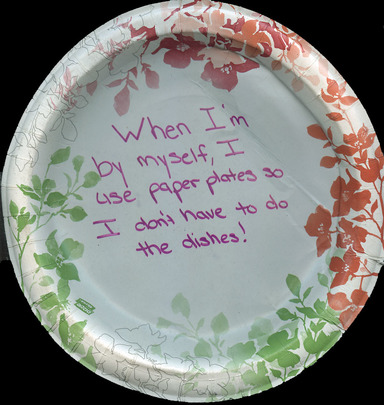 from postsecret.com from postsecret.com John 12:20-26 Very truly, I tell you, unless a grain of wheat falls into the earth and dies, it remains just a single grain; but if it dies, it bears much fruit. Those who love their life lose it, and those who hate their life in this world will keep it for eternal life. This provocative pronouncement, that we must lose our lives to save them, has vital political implications. If you’re Anabaptist like me you might have been raised with the Martyr’s Mirror and tales of those who have risked – even lost – their lives by living faithfully. Christian Peacemaker Teams was founded by Mennonites, Brethren and Quakers on this very notion, that saving lives is worth risking our own lives, and that we save our own lives by living with integrity, even if we die for it. This is freedom, to audaciously express our values rather than sit at home worrying about all we have to lose. There’s another way I read this paradoxical passage that is personal and vulnerable. Justice, peace and martyrdom are perhaps external ways to express Jesus’ command that we lose our lives to save them. If we follow this teaching internally, we find confession. Many Christian churches recite a confession every Sunday – Brethren traditionally don’t, we stay away from creeds and bring fresh words to worship week after week. But we shouldn’t forget confession itself. Those who love their life lose it, and those who hate their life in this world will keep it for eternal life. Losing our lives to save them can be like hitting rock bottom. Janis Joplin sang “freedom’s just another word for nothing left to lose,” and she lived and died that reality. She hit rock bottom, but it came too late and she died of a drug overdose. If we’re lucky, we hit rock bottom with someone around to witness it and support us. Hitting rock bottom means we’ve got nothing left to protect, we’ve lost our security, our stability, our secrets. Hitting rock bottom is terrifying and dangerous, and if we survive it, it’s an essential opportunity. Once we’ve hit rock bottom and can’t pretend things are okay, when we can’t keep our own secrets anymore, we can finally confess. And it saves our lives. But before we hit rock bottom, before confessing can save our lives, we hold on to control with all our strength. I went biking yesterday to celebrate the summer weather. I bike pretty much every day; I use a bicycle for transportation. But yesterday I was biking just for fun, and exploring a new place. It was rocky – not only little gravel, nearly fist-size rocks, and all of a sudden I wasn’t having fun. Biking for transportation means I’m nearly always on the street. But when I was a kid I biked for fun, and I biked through gravel and rocks and mud and it was fun. What changed? When I was a kid I wasn’t so serious about being in control. Now I have a low-tolerance for being out-of-balance. As soon as my bike starts to lean or kick without me asking it to, I’m scared. As a kid I held much more loosely to the handlebars…and pretty much everything. Now I hold tight so I won’t come close to falling. When I noticed all this yesterday I decided to relax and then the rocks weren’t so bad, sure I had to adjust and readjust and correct and correct again, but I never fell. What I lived in that ten minutes we’ve all lived in our lives, and we’ll live it again. We feel out-of-balance and we cling tighter to every thing we can control. We’re afraid to let gravity work on us, we’re afraid to see if we can adjust, adapt. When we hold on so tight we’re not safer we’re just more miserable. We still believe we have too much to lose. How does your faith help you relax your grip on your life? On your children? On your spouse? On your coworkers? On your own longings? Confession is good for the soul, we say, and all kinds of religions practice it. From Yom Kippur to Catholic Confession, from Buddhist repentance within the sangha to AA stories within the meeting, baring ourselves before God and our trusted comrades is fundamental to our spiritual wellbeing. Confession is actually making a comeback within the church, and it’s also showing up outside the church, in movies like Flight, where Denzel Washington flies a jet upside down, or the international sensation PostSecret, which has inspired millions of people to write anonymous confessions on a postcard and mail them to a man named Frank. However we do it, confession acknowledges that we’ll never be perfect, that perfection is impossible, but that we’re still striving to be the best we can be. Confession is an expression of faith in ourselves, that we are works in progress, worthy of effort! Confession is an expression of faith in God, who created each one of us with affection, with hope, with earnest desire that we would keep striving toward wholeness. Jesus teaches us about confession throughout the gospels. Remember the Samaritan woman at the well. Jesus asks her for a drink and they start a theological conversation. Then it gets personal – turns out she’s had 5 husbands, and the man she’s with now isn’t her husband. Risqué in 2016, let alone year 30! Jesus doesn’t bat an eye. He just dwells with her at the well, discussing living water. He doesn’t judge her, he doesn’t ask her to change, he shows her that, at least in that moment, she has the freedom of having nothing left to lose—her secret is out, and he does not reject her. And we can trust he did dwell with true respect and compassion, because she goes running back to her town to proclaim the good news that she met someone who “told her about her whole life,” and she would only do this if she had been blessed by the encounter. Jesus is present with this woman in the face of her shame, he sees her completely and does not turn away, he faces her, her secrets bared, and does not flinch....
0 Comments
Leave a Reply. |
Archives
January 2022
|

 RSS Feed
RSS Feed